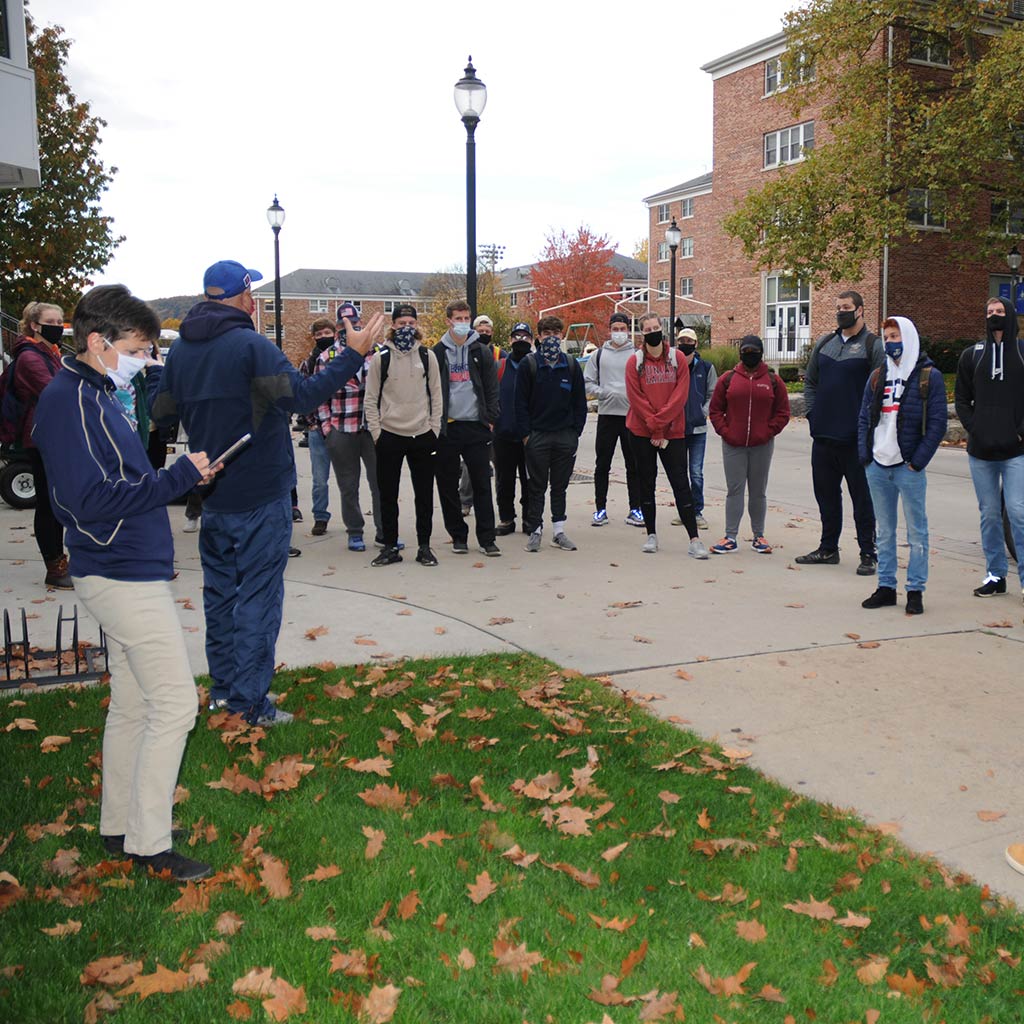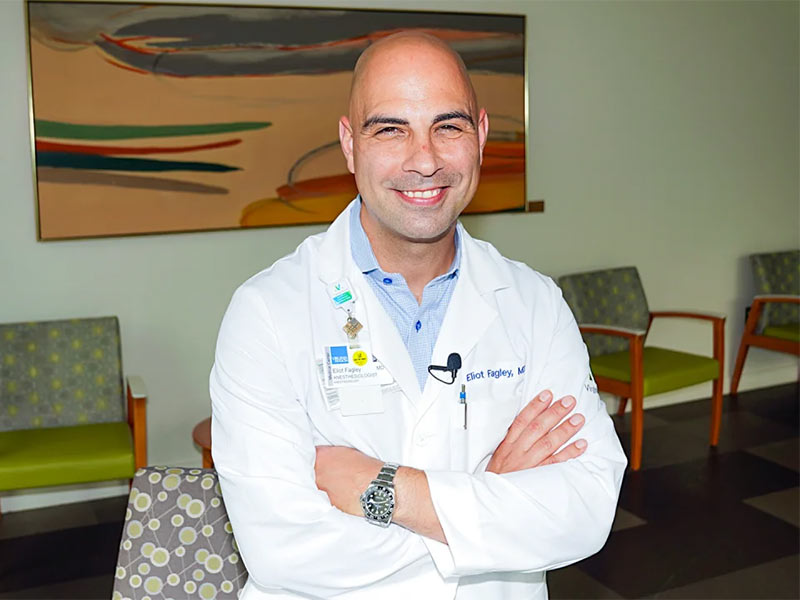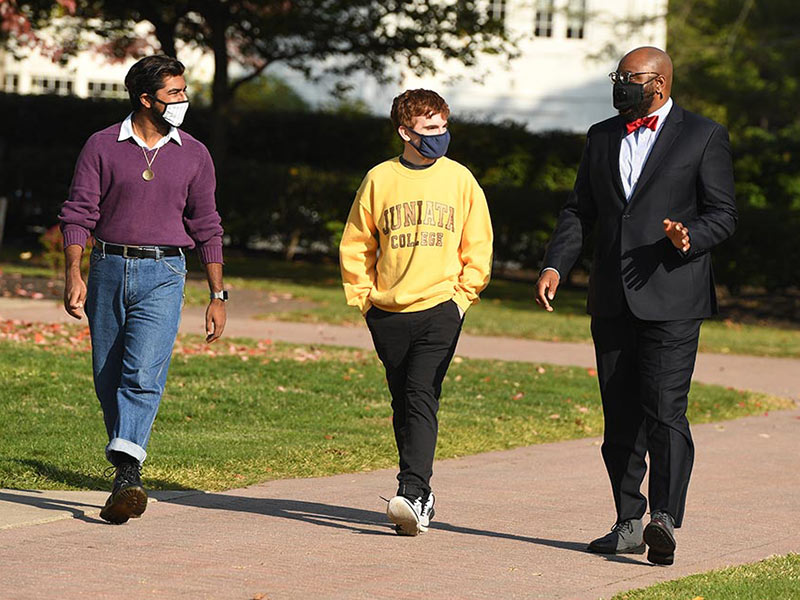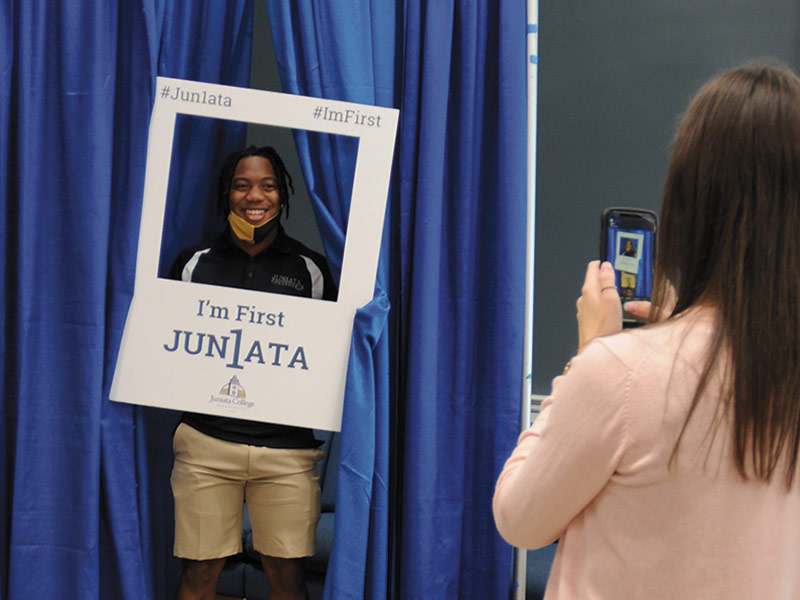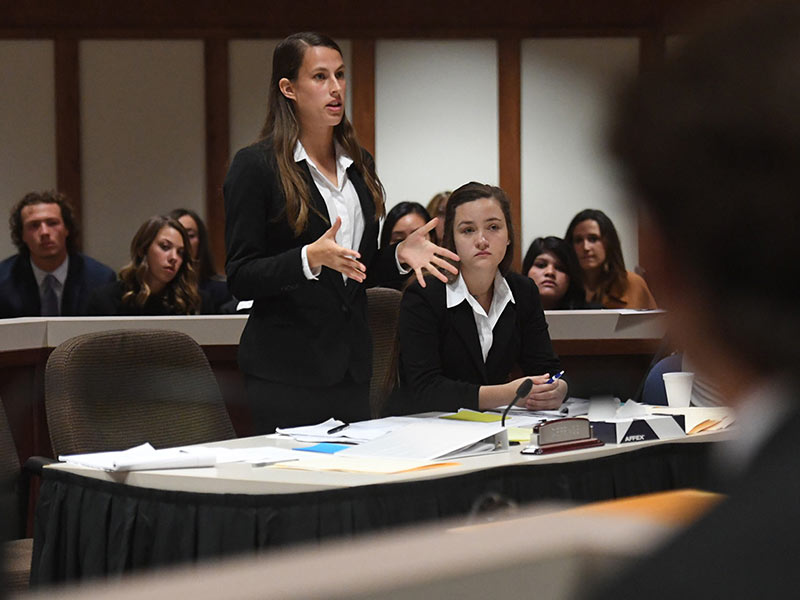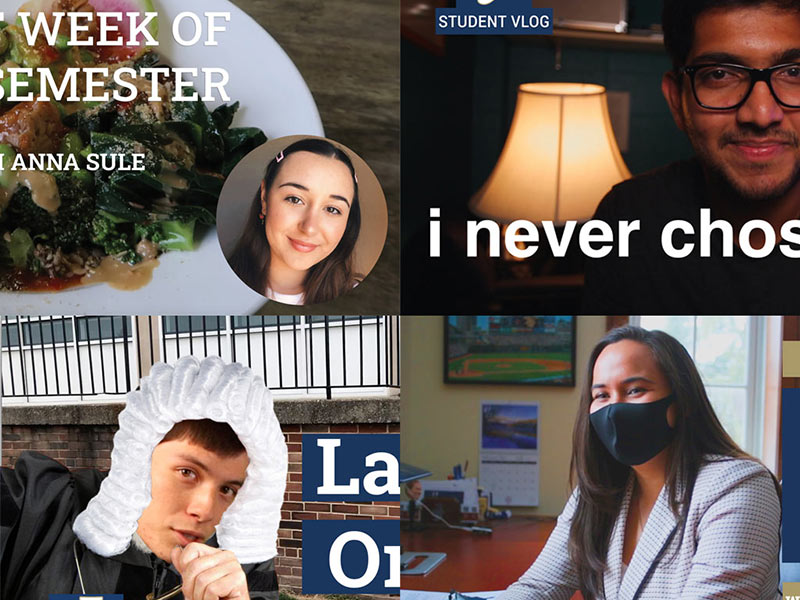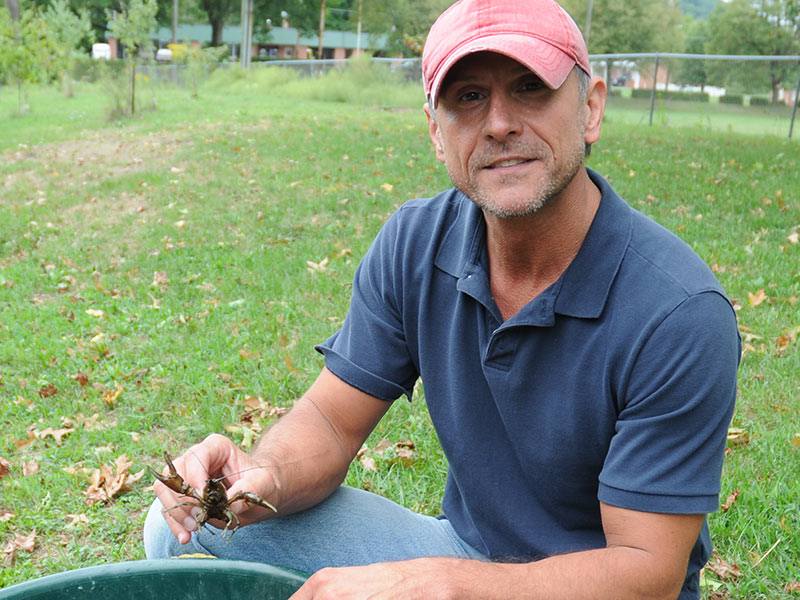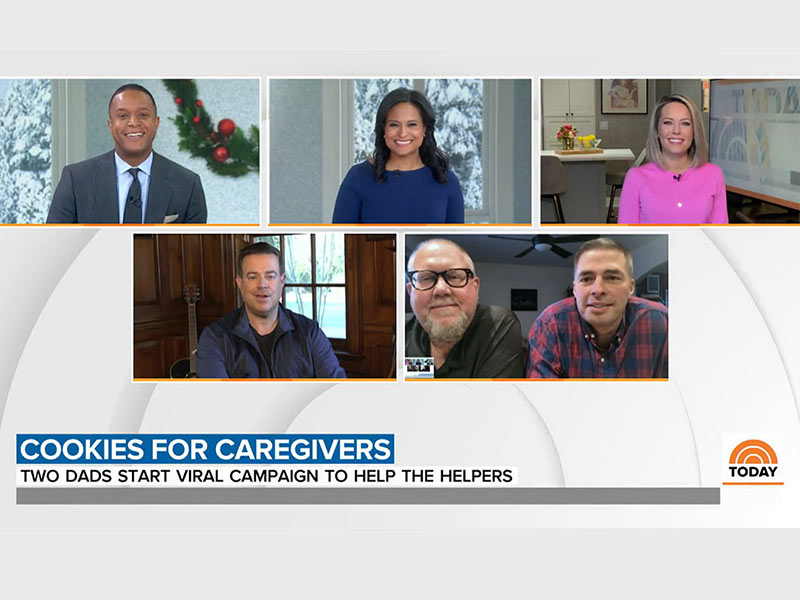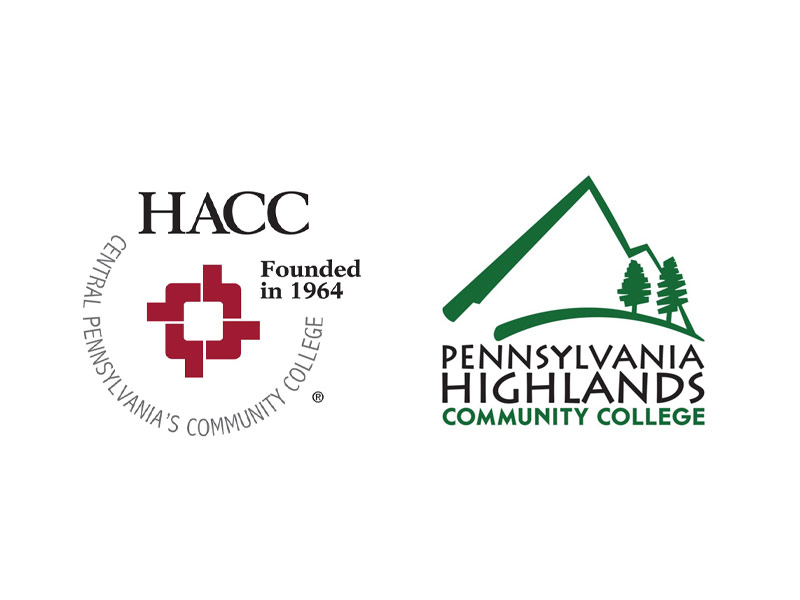It was with the students’ best interests in mind that the department recently launched an accelerated master’s program (currently enrolling for fall) and the Healthcare Administration concentration within the MBA (master’s of business administration) program.
“Some people argue that (colleges and universities) are not being responsible for the society — that we’re not being career-oriented, but this is not the case at Juniata,” said Dr. Wei-Chung Wang, associate professor of business and economics. “We care about whether or not the students could have a bright future with what they learn. This is especially so in the business department.”
“We teach our students not only the information from the textbook but also what we have experienced in the field.” Dr. Wei-Chung Wang, associate professor of business and economics
With six faculty members in the department previously employed at four of the world’s largest accounting and consulting firms, they know all too well that business education relies upon more than the technical information shared in the classroom.
“We teach our students not only the information from the textbook but also what we have experienced in the field,” said Dr. Wang.
This industry experience is why many students and alumni continue to recommend Juniata’s ABE department to prospective students. “No matter what field you ultimately want to go into, there is a faculty member with real experience willing to help you,” reassured Mark Wolf, a 2020 graduate, and current MBA student.
But it doesn’t stop there. From international business experiences and guest speaker series to business case competitions, students learn first-hand from experts in the field and get to partner with local businesses. Dr. Wang leads the “Business in China” trip, where he’s taken classes to visit General Motors in Shanghai and the Coca-Cola plant in Beijing, just to name a few. During these site visits, which include other small to mid-sized corporations, students get to speak directly with management and gain first-hand knowledge about what it’s like to run such a company.
“Right before the pandemic took hold of everything, the ABE department was about to launch two other short summer programs,” said Randy Rosenberger, Professor of Economics & Business Administration. “I was going to take students to Germany, with Dr. Wang, in May of 2020. Professor Li Shen was all set to launch a short summer program to France and Morocco, also slated to run last spring. These programs are on hold, but we expect to deliver them as soon as it is safe.”
In many courses, students also partner with real businesses and clients on projects.
“It doesn’t get more immersive than that,” said Emily Hoffeditz ’20, a current MBA student. “All of these real-life scenarios, though simulated in their own way, are preparing us to take that leap from the classroom to post-grad employment. It’s one thing to know about something, while it’s another to put it into practice.”
Perhaps the best-known hands-on learning experience in the department is HOBO (named for an earlier iteration of the class, Human Behavior in Organizations) hike. This tradition dates back to the spring of 1975. “The course in which the Hike resides was created by (the late) Dr. Ron Cherry after Ron had been a visiting professor at Harvard University for a year,” explained Randy Rosenberger, who received the baton in 1998 and has upheld the tradition all these years. “He wanted an exercise that could provide students with a hands-on chance to learn about course concepts. The HOBO Hike is a group decision-making exercise with real consequences. If your group makes poor decisions, you are going to end the hike day very unhappy and very tired. Students have told me they hiked anywhere from 16-24 miles, over terrain that is no walk in the park.”
The hike, while intense, is another way the department helps students apply their lessons to real life.
A theme that quickly emerges when talking to students in the department is how much faculty care and their tireless efforts to provide meaningful experiences.
“There’s a ’no student left behind’ culture where professors go above and beyond to ensure the success of every student,” offered Mike Realbuto ’21, who is studying Marketing and Communications. His professors have helped him land, not one, but two credit-based internships, which are paying off in his current job search.
This sentiment was echoed by Libby Schreffler ’21, whose POE is entrepreneurship with a minor in History. “The level of care and concern for students is unmatched,” she said. Schreffler added that she’s grateful for the real-world experience she’s had at Juniata, such as the market research her marketing class is doing for Kish Bank.
For ABE students — and those from other POEs — who have an entrepreneurial spirit, one of Juniata’s real gems is the Juniata College Center for Entrepreneurial Leadership (JCEL). There, budding entrepreneurs can get the support they need from day one.
“JCEL was by design a multi-faceted learning laboratory for students from all POEs,” reflects (Dr.) Michael S. Lehman, ’94 (MD, MBA), founding Executive Director and AVP of JCEL. “From the physical space and access to capital to the opportunity for state tax credits and curriculum design, a portfolio of resources was created for Juniata students from all fields of study to put theory to practice.”
The center has been instrumental in getting student startups off the ground. Take, for example, Joey DiGangi, a 2018 graduate and a current student in the MBA program. DiGangi, who had never even considered starting a business, launched his own software company thanks to mentoring and funding from JCEL and has since launched another.
As a high school student, DiGangi says he liked everything but wasn’t passionate about anything. He couldn’t find that one thing he wanted to do, so he came in as exploratory. “My professors helped me realize I have this entrepreneurial bug I never expected myself to,” he admits. He started to go down that path as an undergrad, but it all came full circle when he was in Taiwan after graduation and had a life-threatening allergic reaction.
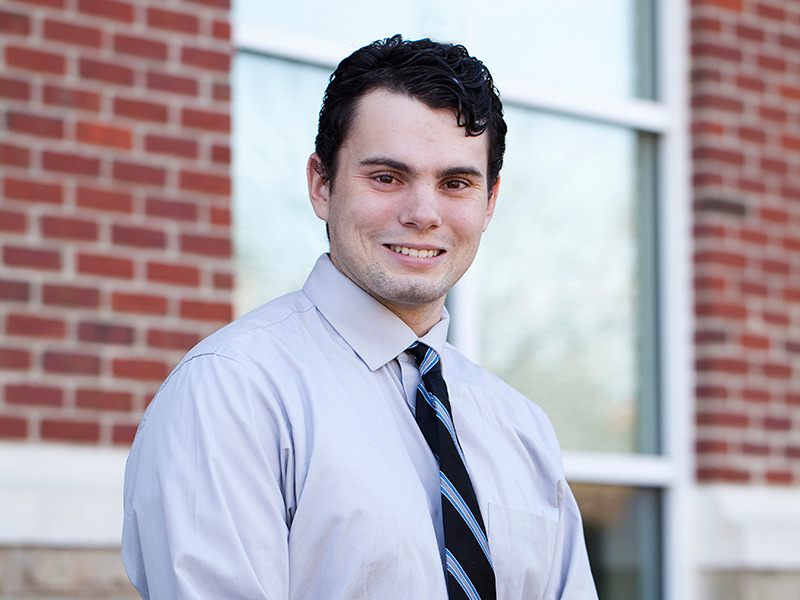
“My professors helped me realize I have this entrepreneurial bug I never expected.” Joey DiGangi ’18
"I wasn’t able to properly communicate what I was allergic to, so they gave me something with peanuts in it," he explained, "and I went to anaphylactic shock and had to be taken to the hospital. It was really scary but afterward, I was like, ‘How can I solve this? I’m here for six more months.’ From there, I started looking at some of the development tools that I had learned and looked at the website tools I learned in a cross-curriculum class. By constructing all these different databases filled with every language you can say peanut in, I learned how to build a really basic application that let me communicate the rest of my time there."
The EpiCenter App for Food Allergies from DiGangi’s company, AssureTech, quickly garnered attention in the marketplace. You can find it on the Google Play Store and Apple App Store.
The innovation encouraged and displayed by students and graduates like DiGangi is fully ingrained in the program. The newest ABE programs have been shaped directly by student feedback.
As Swigart Associates Associate Professor of Business & Economics Kathy Baughman puts it, it’s really about listening to students and how you can help them achieve their goals. For instance, the department developed the new healthcare administration concentration in response to a high level of interest among MBA students.
Baughman and fellow faculty members noticed that many students were working in healthcare. In addition, she observed a unique trend in her Professional Ethics course. “A lot of our students were talking about healthcare current events, and it turned out that we had a focus in that one course about healthcare cases and issues,” she explained.
While the MBA coursework is great, it doesn’t necessarily cover the unique situations students may face in the healthcare industry. The new concentration allows students to delve deeper into business concepts in a healthcare context. Similarly, the 3-plus-1 accelerated master’s program stemmed from student need. Graduates with a bachelor’s degree were successfully entering the workforce upon graduation, explained Dr. Wang, but they didn’t have the credentials required when promotion opportunities came along. Getting the promotion meant juggling an advanced degree program part-time along with work and family life, and obtaining that advanced degree could take two to three years.
“The time commitment is humongous,” he said. “You spent four years in college and now you’re tacking on two more years of time and tuition to get those credentials. Is that worth it, and are we being responsible for the students’ future if we ask them to front that much cost to get that credential? Taking that into consideration is where the expedited degree program came about.”
Enrollment for the program is still open but, already, four students will start in the fall.
“The networking opportunities that we try to provide, the internship opportunities… all the experiential learning opportunities that we provide along the way will only enhance your chance to get a good job upon graduation. We want the best for our students.” Dr. Wei-Chung Wang
If two new programs developed from student feedback aren’t enough proof that Juniata professors are successfully preparing their students for the future, the numbers say it all. Student loan default rates are ultimately a reflection of how an institution’s graduates are doing in the job market. As of 2017, the national student loan default rate was 9.70%, while Juniata’s came in at a mere 3.1% (compared to 6.7% for other four-year private institutions).
There’s a reason why the student loan default rate is so much lower, Dr. Wang said. “The networking opportunities that we try to provide, the internship opportunities… all the experiential learning opportunities that we provide along the way will only enhance your chance to get a good job upon graduation,” he said. “We want the best for our students.”

